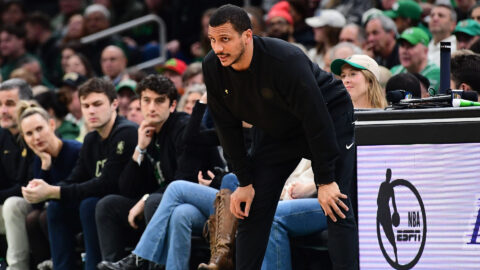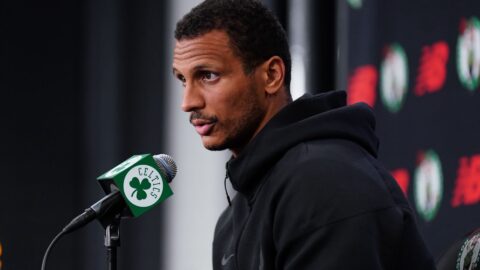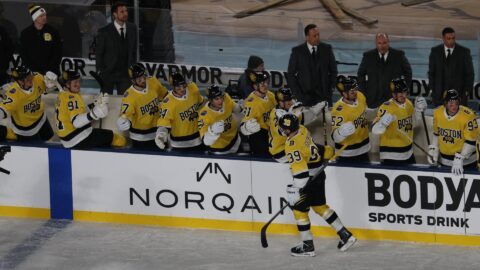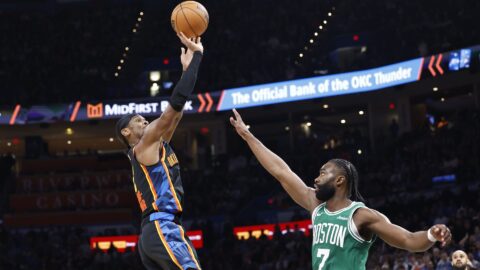Magic and Bird. Bird and Magic. They were the two iconic figures of the NBA in the 1980s, the two men who saved the game and the two men who kept it alive for a generation of fans.
On the floor, they were similarly great players — team-oriented guys who made everyone around them better and would stop at nothing to win. Off the floor, they could not have been more different. They were the yin and yang of the NBA, the gregarious black superstar in Hollywood and the quiet, introspective white guy dubbed the "Hick from French Lick."
Magic Johnson and Larry Bird are the two subjects of Magic and Bird: A Courtship of Rivals, a made-for-TV documentary that premieres March 6 on HBO. The film, directed by Ezra Edelman and produced by HBO Sports president Ross Greenburg, goes inside the lives of the two NBA legends, examining both the players and the men who epitomized basketball in the 1980s.
The story of Magic and Bird begins in 1979. That's when Magic's Michigan State Spartans and Bird's Indiana State Sycamores, the nation's two best teams led by the nation's two biggest stars, met in the NCAA Tournament final. It was the highest-rated college basketball game in history and it was a game that would forever alter the landscape of basketball in America.
The game catapulted Magic and Bird to even more attention on the national stage. Magic reveled in that attention; Bird shied away from it. But both went on to become immediate superstars in the NBA, as Magic went No. 1 overall to the L.A. Lakers, and Bird went to the Celtics, who drafted him the previous year.
Magic became caught up in fame and stardom in Hollywood — he went to countless parties, met countless women and became a superstar in every sense of the word. Bird was the complete opposite. He was gritty, hardworking and relentless. He dove into scorers' tables for loose balls. He was quick to fight with opposing players. He went about his business — he showed up, he won and he went home. He would rather be seen mowing his lawn outside his rural Indiana home than partying on the town.
But it was their difference in race that was magnified by the political climate in America in the '80s. Bird shied away from the issue; he hated being called the "Great White Hope" of the NBA. To all outward appearances, he was the only man in America who really just didn't see race.
The film captures all of these psychological and cultural contrasts between Magic and Bird in living color, but more importantly, it chronicles their historic rivalry on the court. Between 1980 and 1989, every NBA Finals featured either Magic or Bird. Magic's Lakers and Bird's Celtics met head-to-head three times, in 1984, '85 and '87. You see all the key moments, from Bird's heroic performance in '84 to Magic's famous "baby sky hook" that sank the Celtics three years later.
For all the great moments on the floor, there were traumatic moments off it. Bird endured a childhood of poverty, with fighting parents and an alcoholic father dealing with post-traumatic stress after a tour in Korea. His parents eventually split up and his father committed suicide.
Magic's lust for life caught up to him. His diagnosis with HIV in 1991 brought his career to a halt and made the world realize his mortality. Magic was 32, and his reign as one of the greatest players of all time had been tragically cut short.
But his legacy lived on, as did Bird's, despite a multitude of nagging injuries that kept him from playing on into his late 30s. Both men are remembered as saviors of a game that had lost its place in America's hearts.
There's a great moment toward the end of A Courtship of Rivals where Bryant Gumbel, one of the media figures featured prominently in the film, violently dismisses the idea that Michael Jordan saved the game of basketball. Magic and Larry saved the NBA, he argues. Magic and Larry.
After you've seen this documentary, it's hard to disagree. That's what the film is about: Two players who saved the game, and two men that a generation of fans will never forget.



